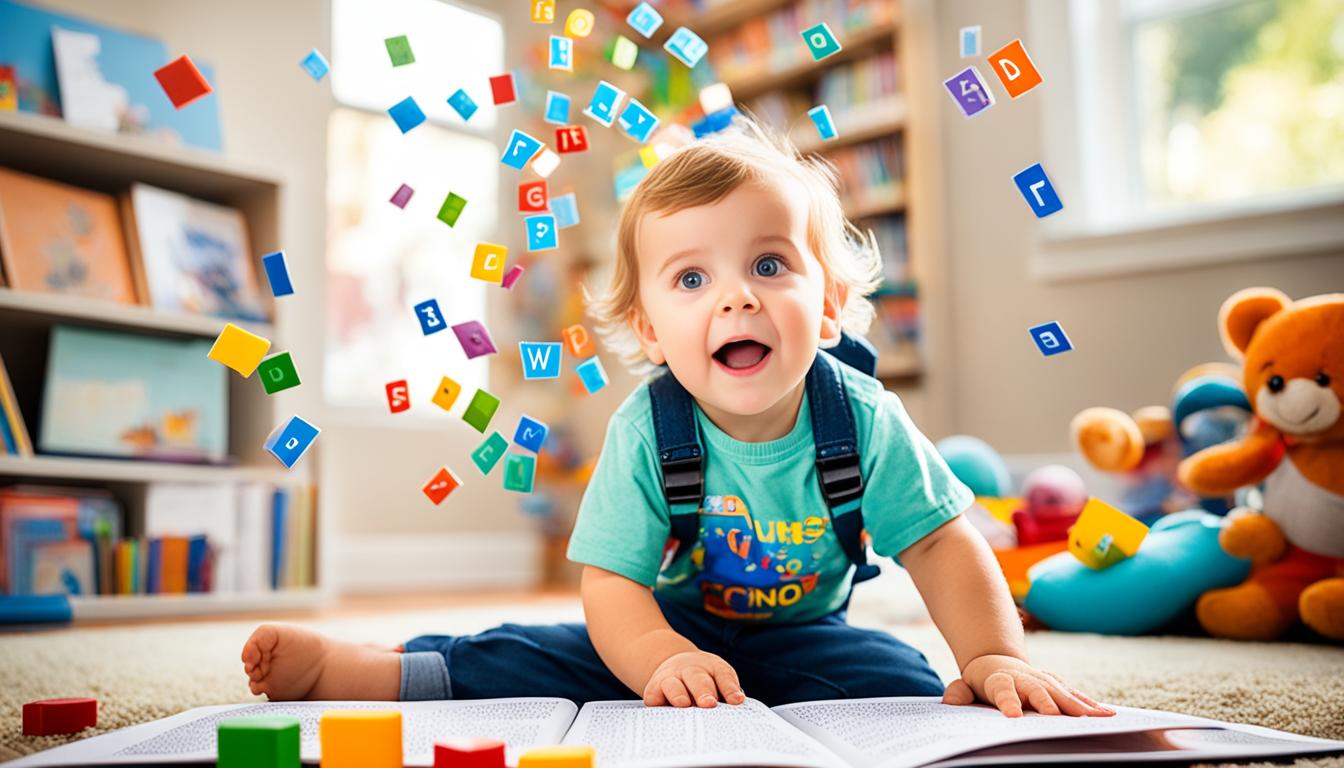Developing early communication skills in babies is crucial for their language and social development. Receptive skills involve responding to cues, while expressive development progresses from gestures to words. Caregivers have a vital role in nurturing these skills through positive interactions and support. Milestone charts are useful for tracking progress and identifying potential delays, which can guide caregivers in fostering key communication milestones. Early communication skills have a significant impact on overall development, leading to improved social interactions and potentially preventing future issues. Fostering these skills is essential for babies’ language development and future success. Discover more about the importance of early communication skills for infants’ growth.
Key Takeaways
- Social engagement and communication are crucial for infants' language development.
- Caregivers play a vital role in fostering early communication skills.
- Milestone charts aid in monitoring and supporting infants' communication development.
- Positive caregiver responses support infants in reaching communication milestones.
- Early communication skills significantly impact infants' overall development.
Social Engagement and Communication
To develop early communication skills, infants and toddlers engage in social interactions that involve listening, understanding, and responding to language cues. This social engagement plays an essential role in the child's language development, as they learn to interpret gestures, facial expressions, and early words. Through these interactions, young children begin to grasp the nuances of language and communication, setting the foundation for future skills.
Learning social rules like turn-taking and appropriate expressions is pivotal for the child's communication development. By participating in conversations with caregivers and adults, infants and toddlers sharpen their receptive and expressive communication skills. Positive interactions with adults greatly influence a child's language learning process, providing them with the necessary support and guidance to navigate the complexities of communication effectively.
In essence, social engagement is the gateway through which children enter the world of language and communication, honing their skills through active participation in social interactions from an early age.
Receptive Communication Skills

Developing receptive communication skills in infants and toddlers involves actively engaging them in listening and understanding language cues through interactions with caregivers.
Here are some key points to keep in mind:
- Infants and toddlers start developing receptive communication skills by responding to their name and following simple directions provided by caregivers.
- Observing infants and toddlers for signs of receptive communication development, such as turning their head towards sounds or making eye contact when spoken to, is important.
- Receptive communication milestones play a fundamental role in building the foundation for language and social engagement in children.
- Providing a supportive environment where infants and toddlers are encouraged to listen, understand, and respond to language cues is essential for their overall development.
Expressive Communication Development

Engaging with infants and toddlers in expressive communication development involves encouraging them to convey their thoughts, feelings, and needs through various forms of expression. As children progress in their early communication journey, they move from simple gestures and sounds to more complex forms of expression like combining gestures with words. Supporting your child's expressive communication development is important in helping them reach language and communication milestones at the appropriate ages. This can include activities such as responding to your child's first words, interpreting their facial expressions, and engaging in pretend play to enhance their communication skills.
Below is a table summarizing key aspects of expressive communication development in children:
| Child's Age | Communication Development | Support Strategies |
|---|---|---|
| Early infancy | Focus on non-verbal cues and gestures | Encourage pointing and waving |
| Toddlerhood | Shift to using words | Respond to first words spoken |
| Preschool years | Combine gestures, sounds, and words | Engage in pretend play activities |
Importance of Caregiver Interactions

Caregiver interactions play an essential role in nurturing and enhancing babies' early communication skills. These interactions are critical for infants as they begin developing communication skills.
Here's why caregiver interactions are so important:
- Positive Responses: When caregivers respond positively to a baby's attempts at communication, it encourages them to keep trying and improving their skills.
- Enhancing Communication Milestones: Interacting with caregivers helps babies reach important communication milestones, such as making eye contact, babbling, and eventually forming words.
- Building Social Connections: Regular interaction with familiar individuals, especially caregivers, helps babies learn how to engage with others and form social connections.
- Supporting Infant Development: Through caregiver interactions, babies not only develop their communication skills but also enhance their overall infant development by feeling secure and loved.
Building Blocks for Language Development

When it comes to language development in babies, early speech sounds, eye contact, gestures, and babbling are key building blocks. These foundational elements pave the way for effective communication skills as infants grow.
Early Speech Sounds
During infancy, mastering early speech sounds serves as the foundational building blocks for language development in babies. Here are some key points to understand the importance of early speech sounds:
- Infants typically begin making speech-like sounds around 6-8 weeks old, laying the groundwork for future language skills.
- By the age of 6 months, babies often engage in babbling, repeating syllables like 'ba-ba' or 'da-da,' indicating their early communication growth.
- Around 9-10 months, infants start imitating more complex speech sounds, which is vital for the development of their language skills.
- Mastering these early speech sounds is essential as it paves the way for later language development and effective communication skills in babies, enabling them to express themselves beyond their initial gestures.
Understanding and supporting a baby's progress in making these early speech sounds can greatly impact their overall language acquisition and communication abilities.
Eye Contact Importance
Mastering early speech sounds paves the way for effective communication skills in babies; similarly, establishing eye contact is essential for their language development.
Eye contact plays a pivotal role in helping babies form social connections and interpret non-verbal cues essential for communication. By engaging with caregivers through eye contact, babies learn to focus on facial expressions, emotions, and social interactions, laying the groundwork for language development.
Research shows that eye contact supports bonding, trust, and enhances communication skills in infants. Encouraging babies to make eye contact fosters attention, engagement, and the ability to understand social cues, leading to improved communication outcomes.
According to child development experts, 'Eye contact is a key component in establishing relationships and developing language skills in babies.' Hence, it's important for caregivers to recognize the significance of eye contact in promoting early communication and social interaction for the overall development of infants.
Gestures and Babbling
Early gestures and babbling are foundational elements that pave the way for language development in babies. Here are some key points to keep in mind:
- Gestures in Infants: Around 8-12 months, babies start using gestures like pointing and waving as early forms of communication.
- Babbling Development: Typically emerging between 6-9 months, babbling, characterized by repetitive consonant-vowel sounds, acts as a precursor to language development.
- Building Blocks for Language Skills: These early gestures and babbling serve as essential building blocks for the acquisition of more complex language skills in infants.
- Encouraging Language Development: Research shows that responding to and supporting babies' gestures and babbling can greatly aid their language development.
According to a study published in the *Journal of Child Language*, 'Early gestures and babbling are strong predictors of later language abilities in children.'
Effective Communication Skills Foundation

Building a solid foundation for effective communication skills in infants requires consistent interaction and responsiveness from caregivers. It's important to support your child in developing these skills as they lay the groundwork for future language and social development. Responding to your child's efforts, whether through gestures, sounds, or facial expressions, is essential and impactful in fostering their early language abilities.
Being a good role model by talking, listening, and reading to your infant can greatly influence their brain development and communication skills. According to the American Speech-Language-Hearing Association, 'Early communication skills are essential for preventing future developmental problems.' By recognizing and responding to your child's attempts to communicate, you're actively contributing to their overall growth and well-being.
Utilizing resources like milestone charts can also aid in monitoring and supporting your infant's communication development, ensuring they're reaching important milestones in their early communication journey.
Frequently Asked Questions
What Are the Beginning Stages of Baby Communication?
In the beginning stages of baby communication, you'll notice sounds, facial expressions, gestures, and body movements. Regular interaction with caregivers helps develop early skills. Babies communicate through crying, cooing, smiling, and eventually babbling, marking important milestones in social interaction.
How Do Babies Develop Communication Skills?
You develop communication skills by interacting with caregivers, making sounds, facial expressions, gestures, and body movements from birth. Engaging with language helps in your progress. Responding to your cues and engaging with you enhances your skills.
What Are the 4 Ways Infants Communicate?
Infants communicate through sounds, gestures, facial expressions, and body movements. They use crying, cooing, and smiling to express needs, contentment, and happiness. Infants also make eye contact, reach for objects, and turn towards sounds to communicate effectively.
What Is Social Communication in Child Development?
When it comes to child development, social communication is all about interacting, sharing ideas, and expressing feelings with others. It's like a dance where gestures, facial expressions, and sounds create a beautiful rhythm of connection.
Conclusion
In summary, early communication skills are vital for a baby's development and future success. Research shows that engaging with caregivers and building a foundation for language development are key factors in a child's ability to communicate effectively.
For example, a study by Harvard University found that infants who had more interactive conversations with their caregivers showed greater language proficiency later in life.
Hence, fostering social engagement and communication from an early age is essential for a child's overall growth and development.










